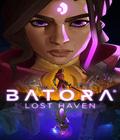At first glance, Batora: Lost Haven looks like a solid adventure game that isn't too different from what's currently available. The presentation is quite nice, even at this early stage of development, and the fixed isometric camera angle doesn't present any gameplay issues during the fluid combat. The puzzles are also good, even if none of them are brainteasers. There wouldn't be much to write about if that's all the game had going for it, but there are a few things that set it apart from other games in the genre.
The most prominent feature is the game's use of color. Your character possesses both light and dark powers, and you can switch between them at any time. Taking a page from games like Outland and Ikaruga, enemies also sport similar colors, and while you can still damage them no matter which color you use, the damage is amplified if you match colors with them. The color mechanic doesn't negate damage inflicted upon you, but it reduces how much damage you take if you are hit with like colors. Like those aforementioned games, the color-switching keeps things frantic. This is especially evident during the demo's boss fight, where his color changes rather frequently and there are even situations where his color status and the color of his attacks were mixed up. On top of that, the color change affects your attacks, as one is used for melee and the other is for ranged.
The use of color isn't limited to combat, as environmental puzzles and even basic traversal relies on this mechanic. This is notable in the dungeons, as you have certain floors that only become solid if you don that same color and switches if you use the same-colored attack. Thus far, the only ability specific to a color is that of possession, which lets you remotely control a large sphere with your dark powers. Colors also affect health bars, as you now have two to manage, but depleting any one of them results in death instead of forcing you to use the other color exclusively.
The attack and puzzle system brings the controls into focus, since Batora uses both a button scheme for its attacks as well as a twin-stick setup. On the one hand, it works fine for all attacks since you can hit in any direction. There's some auto-aim involved, so it can be an issue if you're trying to hit a switch and end up possessing a ball instead. On the other hand, you'll be thankful for having a button do the same thing, since some of the attacks hit twice, which can mess with your puzzles.
Another major feature in Batora is the ability to make choices throughout your adventure. Initially, that doesn't seem like much, since you're simply choosing between one path of progression over another. In the preview build, this is shown off when you choose a path of combat or a path of puzzles on your way to the boss. That's all fine and good, but what's more interesting are the story-based choices, which affect everything else in the process. In the demo, an example is when you encounter a stone with power that you need to obtain to save a friend's father. You can heal the stone to pacify a race of creatures that depend on its energy for food. Both solutions come with different consequences, and neither one leads to situations that work well for everyone. It's a bit melancholy, but there's a hint that everything will snowball from one's choices, so this would appeal to those who like replaying games to see every story variant.
Depending on how the title cultivates its features and gameplay mechanics, Batora: Lost Haven could be a very interesting experience. It's already mechanically solid, but the focus on story choice and a more involved combat system can make this a memorable title. With a nebulous 2022 release date, there's plenty of time to wait and see how development progresses.
More articles about Batora: Lost Haven













 Built on a rich action-RPG foundation, Batora follows Avril — a regular 16-year old girl, not a natural-born hero — as she realizes, after losing everything she cares for, that she is the only one who can save a dying planet Earth from oblivion.
Built on a rich action-RPG foundation, Batora follows Avril — a regular 16-year old girl, not a natural-born hero — as she realizes, after losing everything she cares for, that she is the only one who can save a dying planet Earth from oblivion.












